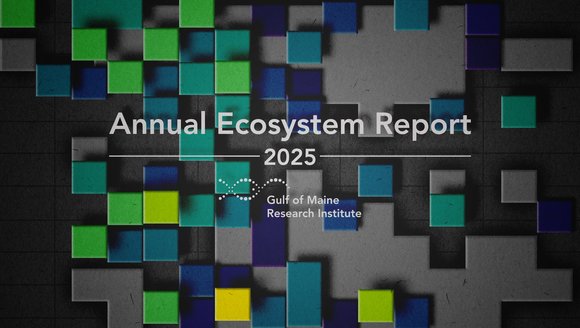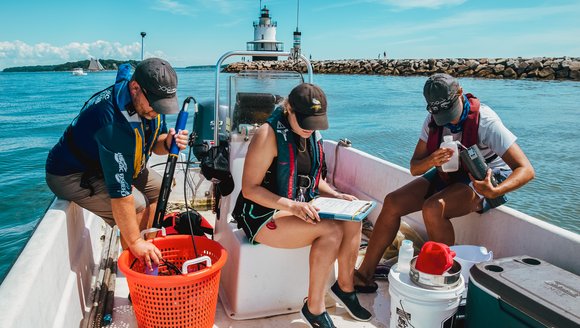Ocean Warming and Climate Leadership
Announcements | Dec 31, 2018
2018 was another warm year for the Gulf of Maine. Our scientists contributed to the foremost national conversation about warming and how it affects our country, and also exhibited local leadership in following an ocean heatwave.

In November, the federal government published the Fourth National Climate Assessment (NCA). Mandated by Congress starting in 1990, the NCA assesses climate change impacts across the U.S., now and throughout the century.
The report included significant contributions from GMRI scientists. Chief Scientific Officer Dr. Andrew Pershing was the lead author for the report’s Oceans and Marine Resources Chapter and Research Scientist Dr. Kathy Mills was the oceans representative on the Northeast Chapter. Their role was to review the scientific literature since the previous NCA (published in 2014) and to state what we know about present and future impacts of climate change in the U.S. Here are some of the highlights from their work on the report:
Heatwaves
Dr. Mills and Dr. Pershing observed and later published a paper on an extreme warming event in 2012. This was one of the first times the term “heatwave” was used in the ocean context. Since then, the U.S. experienced heatwaves in the Caribbean, North Pacific, Alaska, and twice again in the Northeast — most recently this year. These events affected ecosystems, species, and people along the coast.
Fisheries
The report describes the economic importance of fisheries and their vulnerability to rising temperatures. Stories from the Northeast about lobster and cod illustrate these risks, and the report goes on to highlight potential ways to make fisheries more resilient to climate change.
Ecosystem Disruption
Rising temperatures, increasing acidity, and deoxygenation are disrupting marine ecosystems. These disruptions are especially acute in coral reefs and sea-ice ecosystems. While it is possible to build some resiliency in ecosystems, the report finds many disruptions are inevitable, unless carbon dioxide emissions are severely curtailed.
Read More in the Portland Press Herald
Changing climate to put further pressure on New England, federal report predicts
It says 'iconic fisheries' in the Northeast, including lobster, face a bleaker future because of rising acidity levels in the ocean.
Portland Press Herald|Nov 24, 2018
Following an Ocean Heatwave
Last summer, our scientists provided a real-time update on an ocean heatwave in the Gulf of Maine.
As many are now aware, the Gulf of Maine is one of the fastest-warming ocean ecosystems on the planet, according to scientists in our lab. Over the last 30 years, the Gulf of Maine warmed at a rate of 0.06°C per year (0.11°F per year) — more than three times the global average. Over the last 15 years, this region has warmed at more than seven times the global average rate. At both time scales, the Gulf of Maine warmed faster than 99% of the global ocean.
2018 was especially warm and, this summer, scientists at GMRI observed that the Gulf of Maine officially experienced its second warmest-ever day on August 8. On that day, the average sea surface temperature in the Gulf of Maine reached 20.52°C (68.93°F), as measured by satellites operated by NOAA and NASA. This is only 0.03°C (0.05°F) shy of the record set in 2012.
Moreover, this period of 2018 officially crossed the threshold for what scientists call a “marine heatwave.” This phrase describes an area of the ocean that experiences temperatures above the 90th percentile for more than five consecutive days. According to this definition, this Gulf of Maine heatwave started on July 20 and lasted more than a month. However, this statistic downplays what happened throughout the year; only 40 days in 2018 did not reach heatwave levels, and you have to go back to September 2017 to find a sustained period below heatwave levels.
“We’ve set 10 daily temperature records this summer, after setting 18 this winter. We’ve had to add new colors to our temperature illustrations to reflect just how warm the Gulf of Maine has been this year.”
Andrew Pershing, Ph.D. Adjunct Scientist & Former Chief Scientific Officer
The idea of a heatwave in the ocean is a relatively new concept. GMRI scientist Dr. Kathy Mills and Dr. Alan Pearce from Australia independently applied the term “heatwave” to describe extreme temperature events in the North Atlantic in 2012 and off Western Australia in 2011. Since then, a group of scientists, led by Dr. Alistair Hobday of Australia’s CSIRO, developed the previously referenced heatwave definition.
Although the concept of a marine heatwave has only recently been defined, the Gulf of Maine is already pushing its boundaries. In 2012, only six days fell below the 90th percentile. In every year since 2012, the Gulf of Maine has experienced more than 150 of these heatwave-level days. In every year since 2010, the Gulf of Maine experienced more than 80 such days. At the time of this reporting, the Gulf of Maine had already spent 180 days above the 90th percentile, and that preceded the fall period, which has been especially prone to heatwaves.
Why is the Gulf of Maine warming so rapidly? The Gulf of Maine sits in a special corner of the ocean where cold waters from Canada (and ultimately, the Arctic) meet with warm waters from the south. A slight change in these currents can mean a big difference in temperatures, and this region is experiencing more than a slight change. Global warming is causing the glaciers in Greenland to melt. As this relatively fresh water dumps into the North Atlantic, it disrupts the entire circulation of the North Atlantic, pushing more warm water into the Gulf of Maine. It also pushes more warm water into the Barents Sea, north of Norway, another region that has been very warm this year.
“This year (2018) really brings home the connection between Atlantic circulation and the temperatures in the Gulf of Maine. The satellite images from this year show a persistent mushroom-shaped blob of very warm water at the mouth of the Northeast Channel — a deep gully that leads into the Gulf of Maine. Essentially, shifting ocean currents are functioning like a hot water tap that dumps directly into the Gulf of Maine.”
Andrew Pershing, Ph.D. Adjunct Scientist & Former Chief Scientific Officer
Read More in the Washington Post
An ocean ‘heat wave’ just drove temperatures off Maine to near-record highs
There are “weird things happening in the Gulf of Maine,” a scientist says.
Press Clips|Aug 31, 2018





